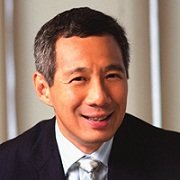Translated by Donaldson Tan

On 16 April 2011, Prime Minister Lee Hsien Loong hosted a mandarin TV forum “live”, engaging a panel of 12 Singaporeans from a cross-section of the population on a wide range of topics. The hour-long programme – Question Time with the Prime Minister – was shown “live” on Channel 8 from 8pm to 9pm. Topics for discussion include social, political and long term issues facing Singapore. There are 4 segments to the debate.
This is the third segment. Click here for: [Part 1] [Part 2] [Part 3][Part 4]
Du Siu Wei [Student, Nanyang Technological University]:
On job insecurity, university and polytechnic students face this problem alike. My elder brother just graduated from a polytechnic and he can’t find a job. An employer may attribute more weight to the foreign talent’s foreign degree qualification than my brother’s diploma. As a result, he loses out on this aspect. He is still job hunting. What policies do PAP have to address this problem?
Lee Hsien Loong [Prime Minister]:
Our policy is a calibrated approach towards foreign talent. If we let in too many, the economy may not be able to absorb so many. If we let in too few, it may result in lesser job opportunities for Singaporeans. Hence, I disagree with how Bernard Leung framed the issue of foreign talent. Foreign talent doesn’t take jobs away. In moderation, they create more jobs for Singaporeans. For example, a foreign entrepreneur comes to Singapore. There is no way all his employees are foreigners. He has to hire Singaporean workers, professionals and polytechnic graduates.
Moderator [Zeng Yeli]:
Among us is a foreign talent cum entrepreneur who is now a Singapore citizen. Her name is Chen Li. You have been in Singapore for over twenty years.
Chen Li [New Citizen, Entrepreneur]:
Singaporeans tend to have negative impression of foreign talents. For example, they perceive foreign talents responsible for snatching jobs and causing traffic congestion. However, foreign talents do contribute to the economy. There are many foreign talents in the local universities and research laboratories. What does the government intend to do to keep these talents in Singapore? They may leave Singapore for greener pasture, or simply return to their home countries.
Lee Hsien Loong [Prime Minister]:
Only a small percentage of foreign talents who come to Singapore becomes citizens, that’s why we hope they are the best qualified foreign talents who can integrate into our society will stay and become citizens. On one hand, the government reaches out to the foreign talent through the grassroot sector. On the other hand, it depends on the foreign talent’s sense of belonging and mutual acknowledgement. There will be some time before a foreign talent accepts Singapore as his new home. Madam Chen, you have been in Singapore for many years…
Chen Li [New Citizen, Entrepreneur]:
Yes, it is difficult for the first generation to accept Singapore wholeheartedly as a home, but it shouldn’t be the case for the 2nd generation. For example, my child views Singapore as his home. I am from China but my child has zero understanding of China. The government shouldn’t give up on courting second generation immigrants in Singapore.
Lee Hsien Loong [Prime Minister]:
They would be completely Singaporeans after serving national service.
Chen Li [New Citizen, Entrepreneur]:
He has already completed National Service.
Jiang Pei Sheng [Managing Director, Mr Bean]:
You shouldn’t feel this way. You are a new immigrant while I am old immigrant.
Chen Li [New Citizen, Entrepreneur]:
I am a new immigrant.
Jiang Pei Sheng [Managing Director, Mr Bean]:
My father comes from China. It is only a matter of time that immigrants like us become integrated with society here.
Yang Junwei [Media Freelancer]:
I don’t think every immigrant thinks like that. For example, when I was flying to Xiamen, I met a second generation Singapore immigrant who sat right next to me in the plane. He is a government scholar. Upon seeing his strong immigration instincts in his parents, he may feel that Singapore is only a springboard for betterment. His final destination may be the United States instead of Singapore.
Lee Hsien Loong [Prime Minister]:
Of course there is a percentage of immigrants who thinks this way. However, we should take a more holistic approach towards evaluating immigrants. Out of 100 immigrants, how many will stay in Singapore and how many will emigrate?
Yang Junwei [Media Freelancer]:
Do you have the numbers?
Lee Hsien Loong [Prime Minister]:
We have initial estimates but we have wait for another 5 to 10 years before the numbers are meaningful. Only then we will know how many stay and where their children will go.
Moderator [Zeng Yeli]:
After discussing so many social issues, the next segment will focus on political issues. A member of the audience proposed to discuss the plausibility of a two-party system and the abolishment of the Group Representative Constituency (GRC).
[INTERLUDE]
Moderator [Zeng Yeli]:
Welcome back. Although the date of General Election remains a mystery, every political party has unveiled almost all its candidates. We have also received many questions pertaining to General Election. Abel, a member of the audience, would like to ask about the two-party system. Hongkong and Taiwan enjoy a two-party system. It didn’t scare away talent and foreign investment and there was no adverse effect on efficiency and economic development. Is the Singapore system really better? Mr Cai, you are from the grassroot sector. Do you have any question for the Prime Minister?
Cai Xiang Bi [Grassroot Leader, Jurong GRC]:
2 days ago, I was in Taiwan where I met a taxi driver. He told me he used to support one party for the betterment of Taiwan. However, ten years down the road, Taiwan has made no progress while the Taiwanese people is now divided into 2 camps. Even Thailand is divided into ‘red shirts’ and ‘yellow shirts’. If Singapore’s democracy were to evolve into a two-party system, how would this divide the people? On what lines would opinion split?
Lee Hsien Loong [Prime Minister]:
This is an interesting problem. It remains unclear if the competitive political environment in Taiwan and Hongkong is a good thing. Western political observers would say this is ideal democratic system, but if you ask Taiwanese, they would express their unhappiness over the deep division of society. Hongkong is also another highly politicised society. If you asked Hongkongers, they would tell you they think the government is obsolete and they are not satisfied with its performance. We not only have to understand the situation of other countries, but also have to further understand the similarity and differences b between Singapore and these countries. While we are not perfect in every area, we have to consider in detail on how to further improve the Singapore system.
Moderator [Zeng Yeli]:
Someone sent a SMS, asking if the government would consider to abolish the GRC.
Lee Hsien Loong [Prime Minister]:
NO. The purpose of a GRC is to ensure that there would be MPs of minority race. This is a very important consideration given Singapore is a multi-cultural, multi-racial, multi-religious country. Without the GRC, the Parliament would not become mult-cultural & multi-racial.
Yang Junwei [Media Freelancer]:
Would the government abolish General Election instead?
Lee Hsien Loong [Prime Minister]:
NO. The difference between Singapore and China is that Singapore is not a one-party state. Singapore is a multi-party democracy dominated by the People’s Action Party (PAP). In order to win the mandate to govern Singapore, the PAP has to enjoy popular support and be accountable to the people. Every PAP member (including MPs) understands that he is here to serve the people and not simply acting as a government official. There is a big difference between the two.
Yang Junwei [Media Freelancer]:
My feeling is that the PAP perceives the Opposition as a rebel of the system who opposes for the sake of opposition. Perhaps the ruling party would consider to change it attitude. After all, Singapore is harmonious and tolerant society. Confucius said, “If we aim high, we will strike middle. If we aim middle, we will strike bottom.” If we set our target high such as two-party system or a multi-party democracy, we can boost the sense of participation among Singaporeans.
Lee Hsien Loong [Prime Minister]:
Look around the world. There is no perfect two-party system or multi-party democracy, even in the United States, United Kingdom, Japan, Taiwan and Belgium. In fact, for the last 300 over days, the political parties in Belgium are unable to organise a government as they are in a political gridlock. Would Singapore be any different? It is not that simple. If Singapore were to implement a two-party system whereby 2 parties take turn to be the government, then every political party must be fighting to be the next government. The Opposition continues to entrench itself as Opposition if they think their role is help the ruling party to do a better job.
Yang Junwei [Media Freelancer]:
I think this is akin to 2 immature children arguing with each other when there is a difference in opinion. Can we aspire to a more mature and ideal outcome?
Lee Hsien Loong [Prime Minister]:
We can consider if there is a perfect example of a functional two-party system.
Wang Yong Bing [Retired Professor]:
Singapore is a secular nation. What Singapore achieved today as a harmonious multi-racial and multi-religious society didn’t come easy. There are many Christians among the 24 PAP new faces, thus I would like to know if the religious motiviation of any PAP MPs or ministers has actually impeded the policy-making process.
Lee Hsien Loong [Prime Minister]:
We don’t approve of this. Religion belongs to the individual’s private sphere and we must accept and respect it. Being secular, the Singapore system demands for church-state separation. Everyone, MP or Minister, is expected to abide by this principle. We don’t allow the values or the religiously-informed conviction of a MP, Minister or Civil Servant to affect the secular nature of the government’s policy compass.


It is rather nauseating for the PM to keep repeating, ad nauseum about minorities being unable to get into Parliament. It is also most unfortunate that no one in the panel asked the immediate next questions:
a) if for minorities’ inclusion, then why GRCs up to 6 members?
b) is Michael Palmer being set up to fail, just to prove that Singaporeans will not accept minorities?